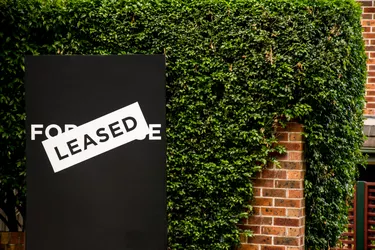
Landlords sometimes advertise the availability of a pre-lease, meaning the tenant may reserve a rental unit for a future date. A pre-lease arrangement requires a prospective tenant to place a money deposit with a landlord to reserve a rental unit. When the tenant is ready to move in, the pre-lease deposit becomes a credit toward the rent. A pre-lease may work to the benefit of the tenant, but this arrangement often favors the landlord.
Early Reservation
Video of the Day
Some pre-lease arrangements work out well for all parties involved. It allows the tenant to reserve a rental unit, so he can begin looking for a place to stay before he actually has to move in. If everything goes well, the pre-lease does not cost the tenant anything because it reduces the amount of rent he has to pay. This arrangement also allows the landlord to get the tenant to commit to a rental unit months in advance of the intended move-in date.
Video of the Day
For his protection, the tenant should always check the rental unit and be certain that he wants the unit before placing a pre-lease deposit. A written agreement must always spell out the terms of the pre-lease arrangement. Pre-lease agreements are also popular in crowded cities where apartment buildings are under construction. According to Luxury Living, prospective tenants like to sign a pre-lease to ensure space will be available in a desirable apartment building that will likely fill up quickly when it officially opens.
Refund Clause
Depending on the pre-lease terms, the landlord may be able to rent out the unit to another tenant even if another tenant has placed a pre-lease deposit. If this happens, the landlord usually has to refund the pre-lease deposit money. While the tenant gets his money back, she loses the ability to use the money for other purposes during the time the landlord holds it as deposit. Additionally, the tenant may find herself unexpectedly and suddenly having to look for another rental unit, according to Financial 4.0.
Contractual Obligations
A tenant commits to a rental unit with a pre-lease deposit because he gets a guarantee that the tenant will rent the unit as long as the landlord makes it available. A landlord financially benefits from having preleased property, meaning there is less risk of getting stuck with unrented apartments. The tenant, however, may find himself saddled with a rental unit he doesn't want because the written pre-lease agreement may not even specify which unit the landlord will reserve for the tenant. If he changes his mind, the tenant will have to forfeit the pre-lease deposit if stipulated in the signed contract, reports HOME Line.
Bargaining Power
A pre-lease agreement takes away the tenant's bargaining power. This is because the tenant has to move in or risk losing the deposit. If the landlord presents the tenant with unfavorable lease terms at the time of moving in, the tenant may not be able to get the landlord to change these terms. Without a pre-lease agreement, the tenant may force the landlord to change the lease terms before signing the lease. With a pre-lease agreement, the tenant has to sign the lease or lose the pre-lease deposit.